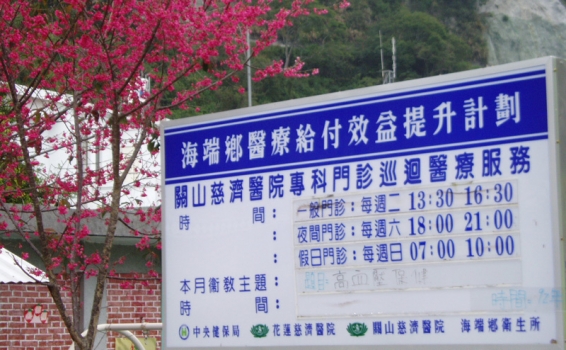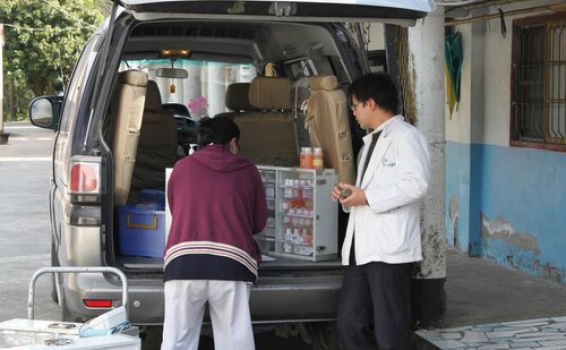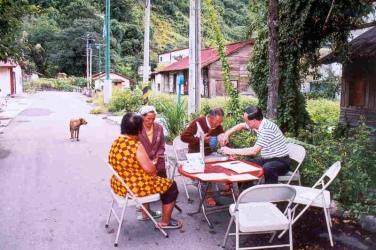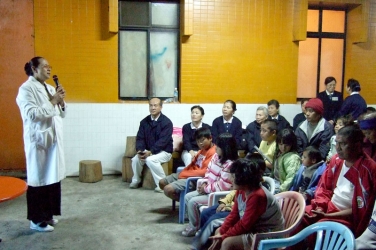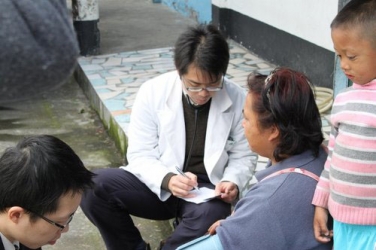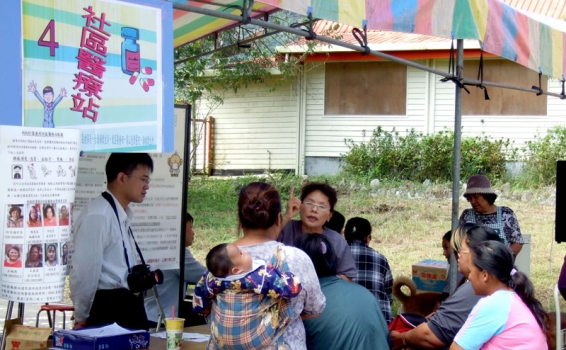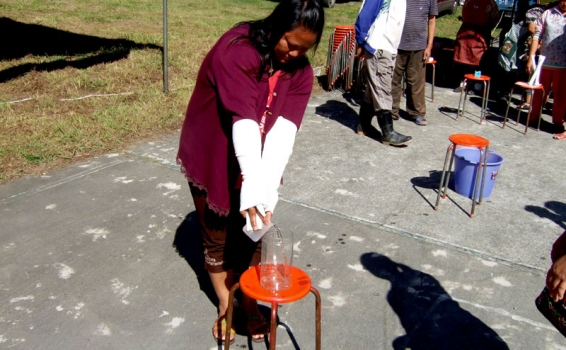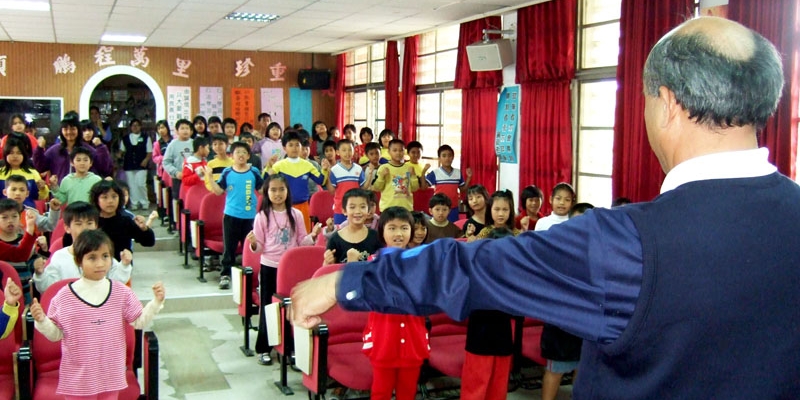Integrated Medical Delivery System in Haiduan Township
Shortly after the opening of the Kuanshan Tzu Chi General Hospital in 2001, the hospital formed a community clinical service program.
Their first outreach was to visit a local tribe in the southern mountains a thousand meters above sea level.
Inhabitants have endured the lack of healthcare and pain and suffering for years.
Kuanshan Tzu Chi Hospital brings along the medicine as well as love.
Kuanshan Tzu Chi Hospital was officially granted a care provider status by the Bureau of National Health Insurance to practice IDS (Integrated Delivery System) in Haiduan Township of Taitung County.
For over nine years, the Kuanshan Tzu Chi Hospital has been serving the residents of Lidao and Wulu as part of a big family. Whether it is medical service, emergency assistance, health education, or visiting the poor, Kaunshan Tzu Chi Hospital mobile team operates year-round rain or shine.
Bringing Healthcare and Hope to Villagers
With magnificent mountains, long rivers, and winding roads as the backdrop, the southern area is especially lacking in healthcare since there is no medical facility near by. Finding appropriate medical treatment becomes a painful experience. It is hard for outsiders to imagine the difficulty the villagers have to go through just to find a hospital. If one is lucky, one could find treatment in-time to cure the suffering. However, others are not that lucky and many die on their way to the hospital.
Kuanshan Tzu Chi Hospital was built to tackle the accessibility of healthcare in the region. The area covered by the hospital includes Luye, Chihshang, and Kuanshan. For far away villages such as the Haiduan Township, our medical team puts them within the reach on our radar screen.
Time to Go Uphill
“Instead of awaiting patients to come to us, why not let doctors go visit them?”
Based on this concept, the Kuanshan Tzu Chi Hospital formed a medical team in March of 2001 to go into the NanHeng Mountain which is a thousand meters above sea level, and started delivering regularly bi-weekly medical service. September 2001, Tzu Chi Hualien and Kuanshan Hospitals were accepted into the “Integrated Delivery System” administered by the Bureau of National Health Insurance to provide medical at-home service, emergency and major illness caring. The Kuanshan IDS medical motorcades were often seen on the road during the nine years period.
Haiduan Township is located in the northern part of Taitung County. The whole township is about eight hundred square kilometers with five thousand residents. There are six villages inside the township: Haiduan, Kanding, Chana, Wulu, Lidao, and Guangyuan. A majority of the villagers belongs to the “Bunun” tribe. Kuanshan Tzu Chi Hospital medical team goes into the mountains regularly twice a week despite bad weather conditions. They not only provide the medical service but also the compassion with loving care about the villagers’ living condition.
Because of the proactive approach to go into the mountains, the Kuanshan Hospital started a mobile clinic medical program to shuttle between these remote villages. This service resulted in patients’ referral to the hospital for better treatment. Patients who have chronic diseases are monitored and provided follow –up treatment. In September of 2001, Hualien and Kuanshan Tzu Chi Hospitals were chosen for the IDS project by the Bureau of National Health Insurance. The two hospitals provide emergency and major illness unit to help patients requiring hospitalization or referral services. Doctors with different specialties are recruited. Each month, a total of thirty-two outreach visits are carried out at different locations. In addition, patients with chronic diseases are monitored and followedup by the teams during the visit. The result is astonishing.
For several years, the mobile medical team is led by Dr. Ching-Feng Hsiao on every Tuesday and Dr. Chao-Jong Chiu on every Friday with an aboriginal nurse who can speak the native language acting as interpreter, and an administrative staff responsible for driving. More supporting staff is provided on an as needed basis. Kuanshan IDS team is different from other hospitals because of the remote location of the villages. As a result, the IDS Team cannot return within one day but have to stay overnight in the clinic. It becomes an opportunity to enjoy the quietness and serenity that can only be found in the mountains.
Nurse Hua-mei Ku is a Bunun tribe who also lives in the Haiduan Township. She said, “When we first started the mobile clinical service, people thought we were here mainly for missionary work. They were afraid to meet us because it conflicts with their own religion. After a while, they gradually realize we are there truly for medical purpose and they finally come to see us.”
Accommodating the Needs of the Local - Fighting Pulmonary Tuberculosis
With three years experience working at mobile medical service team, Dr. Hsiao knows these villages daily routine very well. He said, “Most of the local people grow seasonal vegetables for a living. However, these vegetables do not have a high profit margin. If they don’t harvest on time, once the season is passed, these vegetables are worthless. As a result, they choose to continue working unless they become very sick.”
In order to accommodate the local people daily routine, the hospital made adjustments for the clinic hours. Every Tuesday and Friday the clinic hours are kept the same, but Friday night and Saturday morning hours are added for the convenience of some people to come to the clinic. Gradually, more and more people start to come for service.
Mobile Medical Service
Dr. Chiu leads a medical team that departs from Kuanshan around 4~5am in the morning. The reason is to catch these villagers before they start working. Dr. Chiu had even seen patients in the rice field before. She worried about the villagers not having enough knowledge about Pulmonary Tuberculosis. She not only visited patients to remind them to take medication regularly, but also contacted the local policeman, Yung-Fu Chiu to help arrange a seminar on how to take precautions on Pulmonary Tuberculosis. Chiu was committed to mobilize the entire neighborhood to remind patients to take medication on time. Hualien and Taitung are the two counties with the highest Pulmonary Tuberculosis patients. Because of IDS’ progress, within nine years, all Pulmonary Tuberculosis patients in the villages of Shama, Wulu, and Lidao had fully recovered.
After Dr. Chiu passed away, the job has been taken over by Dr. Tzu-Heng Hsu and other young doctors.
Danger seems to be everywhere on the winding road but Kuanshan Hospital is standing by as a life saving guardian.
The mobile medical service team hops from one place to the other, from Shama and Wulu villages continuing up the hill. Surrounded by these beautiful mountains, it seems like Shangri-la is in here somewhere. However, dangers exist in any corner of the winding road. Policeman Yung-Fu Chiu is from the Shama police station. He is guarding the area. Car accidents happen quite often on the southern highway. He has often driven many injured victims to the hospital, some are residents and some are tourists.
Standing in front of one local grocery store in Wulu village, Chiu looked over the other side of the mountain. Pointing his finger to the other side of the hill where he saw a tourist riding a motorcycle heading to the direction of Wulu. Chiu called out loudly warning him to stop; however, it was too far for the cyclist to hear. He saw the cyclist fall off the cliff.
“Falling off this hundred feet deep cliff, there is no way he can make it,” Chiu mumbled to himself. He quickly rushed to the scene and found the person hanging tightly to a tree. It was a miracle! He summoned help and assisted the person to get off the tree. The injured person was ambulanced to Kuanshan Hospital for treatment.
“Luckily, we have Kuanshan hospital nearby so that people lives can be saved. Otherwise, by the time the injured victims are delivered to the neatest hospital which is either in Hualien or Taitung, they probably would have already died on the way,” said Chiu. Kuanshan Hospital truly benefits a lot of people.
Chiu commented that not only emergency care was available, but also chronic diseases were under better control than before. Twice a week medical service really gives residents a lot of convenience. The alternative bus transportation is only twice a day -- really inconvenient and time consuming.
Delivering the Concept of “Prevention Is Better than Cure”
In 2009, the IDS program operating in Haiduan Township had been in existence for eight years or fourth quarters. The program was coordinated by the National Health Insurance East Region, the Taitung Public Health Office, Hualien Tzu Chi Hospital, Kuanshan Tzu Chi Hospital, and Haiduan public Health office. The Kuanshan Hospital provides regular clinical service in the public health office every Wednesday, and the mobile clinic service every Tuesday, Friday, and Saturday to offer care to chronic disease patients, neighborhood home visiting, and all kinds of health related activities. In addition, the Kuanshan hospital has conducted a series of health seminars to encourage residents a better knowledge in health education.
Starting in 2009, the bi-annual seminar is to be held at the schools. This change is to equip proper health education in the early childhood, and to reduce the probabilities that children become addicted to these bad habits when they grow older. The goal is to also increase the awareness of being healthy among the population.
On February 12, 2009, the first campus seminar was held in the Haiduan Elementary School. Kuanshan hospital staff presented the seminar to all the school personnel, teachers, and students. Nurse Kuei-Chu Chen has plenty of experience in public health issues. She used to work for the local public health office. After retirement, she joined Tzu Chi as a volunteer. In order for students to understand the terrible consequence of illness, Chen prepared a lot of highlights about oral cancer and lung cancer. She hoped by showing these pictures to the children that they would understand the importance to stay healthy and to stay away from bad habits like cigarettes, liquors, and tobacco. Hopefully when they go home they can influence their parents to also reduce the chance of smoking and chewing. The goal is to reduce the overall percentage in smoking, drinking, and chewing among villagers so people can have a healthy and normal live again.
“Wow…so scary…”
Students from the Haiduan Elementary School marveled when they saw the pictures from the projector. It was their first time seeing the enlarged pictures of inner oral cancer as a result of chewing betel nut for a long period of time. White spots festered with germs can spread to the entire face. Students realized the consequences of eating and chewing betel nut. After eight years of planning, the first campus seminar is designed to implant a healthy lifestyle to the children at an early age.
On the 20th, Nurses Kuei-Chu Chen and Hsiao-Fen Chiu, volunteer Ming-Hung Tien, and the National Health Insurance East Region officer Tsun-Feng Tung all arrived at the Haiduan Elementary School in Taitung. About one hundred thirty students and teachers, and even parents gathered together. The nurse projected the photos to explain the consequence after eating chewing betel nut. She also reminded students of the importance of good health that it would be a big mistake to try out these bad habits simply because of curiosity. Mei-Chi Sun, a staff from the public health office, and nurse Hsiao-Fen Chiu also explained the importance of not smoking. By not developing the bad habit of smoking, one will never need to worry about finding a place to smoke in the public and the possibility of being fined. The most important thing is to be healthy.
To make whole seminar more interesting for these students so they won’t be distracted or be bored, volunteer Ming-Hung Tien prepared an entertainment to teach sign language song such as “Thank you Teachers” and “Teacher, I love you” and sang with students. This simple song became the best way for students to express thankfulness to their teachers. The first campus seminar ended in a happy ending. In addition, they also set up the carbon dioxide test for parents to see whether they were smoking or not. It was delightful that everyone passed the test.
The enthusiasm of the children is positive feedback to the nurse and medical staff. They will adjust the materials and make it more suitable for children. This kind of informative and fun campus seminars can really lead students to the right direction of staying healthy in their lifetime. Educated children can refuse the temptation to become addicted to these bad habits, and may even influence their parents’ behavior gradually.
The Kuanshan mobile medical service unit shuttles back and forth on the winding roads. They depart at sunrise and return upon sunset. Whether it is for a health fair, or checking on the communities, they continue their mission in protecting the lives of the people living in these remote areas, just like the founding principle of Kuanshan Hospital when it was first built.

